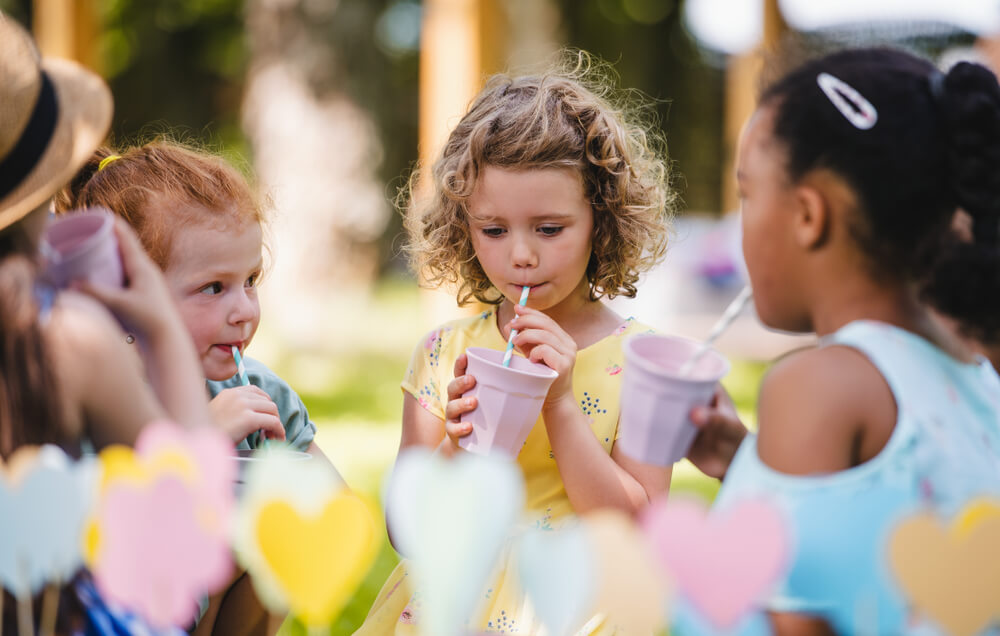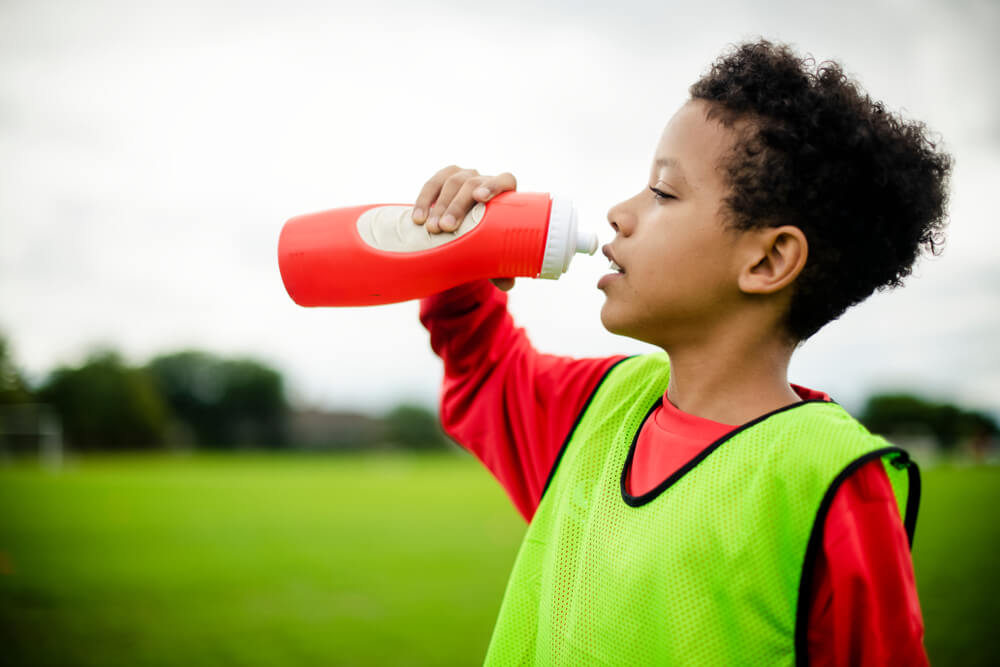Children who enjoy being outdoors should be allowed to spend as much time as they want outside. This gives them a great opportunity to explore, especially during the warmer months. The only caveat is that you have to figure out how to keep them hydrated. Younger children know they are thirsty, but they don’t always point it out right away. Here are seven tips for keeping kids hydrated during hot summer days.
1. Hydration for Kids: Make It Interesting
When children are a little older, they start to make their opinion known without any filters. To some, water is boring. It is true that water has no flavor, and it is nothing great to see. Therefore, proper hydration for kids means that you have to make it interesting.
One option is to freeze fruit in ice cubes, which makes them a tasty and interesting feature. Pick your kid’s favorite fruit. Chop it into pieces that will fit into each ice cube tray slot. Fill the tray with water and freeze. Then, when you notice that it is a particularly hot summer day, add the cubes to a full glass of water.
2. Hydrate a Toddler: Make It Fun
Toddlers can have their opinions, too. They just express it differently at this stage of their life. Instead of using their words, they tend to use their actions. Even though they are thirsty, some will not drink the water. So, make it fun.
You can purchase exciting cups in different colors with bendy straws. Before toddlers learn how to read, they recognize logos. They also recognize items that are purchased just for them. If you purchase a cup just for them, they will acknowledge that it is theirs. Eventually, when they are thirsty, they will seek out the cup even if it has water in it, which is great for hydration.

3. Keeping Kids Hydrated: Make It Tasty
There are adults who do not drink enough water because they say that it is too bland. If adults will not drink the essential fluid, it makes it hard to get kids to do it, too. So, make it tasty.
Kids reach the point when they ask for what they want. If they are thirsty, they will acknowledge it. Instead of asking for water, though, they may ask for juice. You can compromise. Mix three parts water with one part of their favorite juice. This blend gives them enough water for pure hydration as well as some taste.
Another suggestion is to prepare pitchers of water with fruit mixed in. Your child can participate in the preparation. Let them pick out their favorite fruits. Then, let them pour the fruit into the pitcher of water and mix.
4. How to Keep Baby Hydrated: Make It Visible
Parents know that their baby requires attention around the clock. Before your baby begins to speak words, they know what they are feeling. They just express it in the only ways that they can. Usually this means by crying or reaching at objects. Therefore, to keep your baby hydrated, make it visible. Babies know when they are thirsty. If they see their bottle or sippy cup, they will reach for it. If they do not see it, they will cry.
Do the same for older children. Place pitchers of water in the kitchen where they are readily visible. If you trust them to pour their own glass of water, place their cup in areas where they can easily reach it. Then, make sure that the pitcher is always full.
Figuring out how to keep baby hydrated is stressful for new parents. Your pediatric office in Plantation can help.
5. Water Hydration for Baby: Make It Cold
When water is at room temperature, it is not always very savory. If you are out and about, there is not much that you can do if the water temperature has already reached that point. Before you leave your place, however, there are things that you can use to keep your water cold when you’re on the go. This includes ice cubes, thermostat mugs and cooling packs for your bag. When it comes to water hydration for baby, make it cold.
Keeping water cold is a good trick for people of all ages. Water does not have a lot of flavor, so it is not the most appetizing of fluids. Ice cubes are a fast way to make warm water cold while helping to improve its taste. Your other option is to always have a gallon of water in the refrigerator. You can also invest in a home water cooler or a refrigerator that dispenses cold water and ice.
6. Purchase Reusable Water Bottles
To hydrate a toddler, or a child of any other age who can drink fluids on their own, consider investing in reusable water bottles. Children have a sense of things that are their own. Reusable water bottles have come a long way. While it is true that they are environmentally friendly, they are also child-friendly.
Reusable water bottles are available in a range of materials, colors and styles as well as prices. You can take a trip to your favorite retailer and give your child the opportunity to pick one out for themselves. Then, keep it full for them.
Reusable water bottles are also less likely to break if they’re dropped. Plus, since reusable bottles often include a secure lid, there is less opportunity for your toddler to make a mess.
7. Keep It Healthy
The best time to instill good habits in your children is when they are babies. When you are learning how to keep baby hydrated, remember to make it healthy. If your children participate in sports, sports drinks are given to these young athletes without a second thought. You still need to keep them hydrated in a healthy manner by ensuring that they are drinking enough plain water, too.
The easiest way to keep hydration healthy at home is by not purchasing sugar-filled drinks. This way, there is no temptation in the house. Outside of your home, always carry water with you.

Why Is Hydration Important?
By the time a child realizes that they are thirsty, they have already entered the danger zone. It gets more precarious when this occurs often. Dehydration can lead to fatigue, dizziness and lethargy. For children who are playing outside while dehydrated, more serious problems can occur. Some of the most dangerous side effects of dehydration include seizures, low blood volume, swelling of the brain and even kidney failure.
You will know that your child is dehydrated when there is little to no urine in a 12-hour period, they have a dry mouth or their eyes look like they have sunken into their head. If you notice these symptoms, speak with your local pediatric office in Plantation. A checkup ensures that the child is only in need of immediate hydration and not something more serious or more urgent.
Get More Tips
If you still need more information about keeping your baby or child hydrated, help is readily available. For more tips, visit or call your local Plantation pediatric office.



